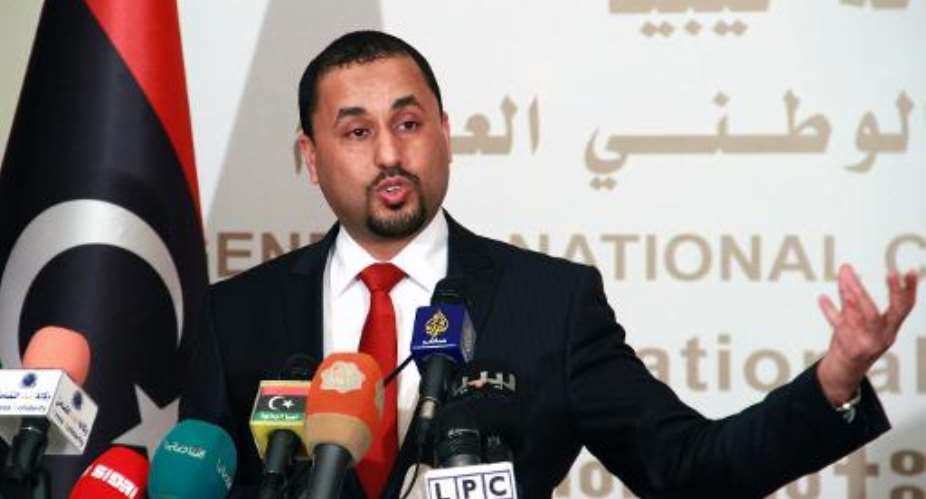Tripoli (AFP) - The rivals of Libya's elected parliament agreed Thursday to join UN-mediated peace talks with the internationally recognised government if they are held on home soil.
The announcement by Salah al-Makhzoum, deputy speaker of the General National Congress (GNC), came as the UN said there was agreement in principle to hold future sessions in Libya, "provided that logistical and security conditions are available".
It came after an attack Tuesday on a luxury hotel in the Libyan capital by Islamist gunmen that killed nine people, including five foreigners.
The UN mission to Libya said participants at this week's talks in Geneva had "expressed concern about the prevailing security conditions in different areas, condemning in particular the recent attack in Tripoli."
The negotiations have brought together warring factions, civil society groups and officials in a bid to form a unity government to end Libya's conflict.
Notably absent has been the Tripoli-based GNC, a transitional body that refused to recognise parliament, which was elected in June but fled to the far eastern city of Tobruk for security reasons.
The Islamist-backed Fajr Libya (Libya Dawn) militia alliance, which took over Tripoli last summer, is also not officially participating in the talks.
But it declared a ceasefire with the Libyan army earlier this month and some of its high-level officials from outside the capital travelled to Geneva for the negotiations.
The GNC's Makhzoum said: "We will actively and seriously participate in the next round of negotiations if they are held in Libya."
And he urged "all political factions to participate in the next round because those who are in Geneva do not really represent" parties to the conflict.
The North African nation has been wracked by conflict since the overthrow of dictator Moamer Kadhafi in a 2011 uprising.
Powerful militias, backing rival governments and parliaments, have been battling for control of key cities and the country's oil riches.
- 'Utter disregard for civilians' -
Human Rights Watch said on Thursday that the issue of rights "regressed sharply in 2014, reaching a low point since the end of the uprising" that toppled Kadhafi.
"The outbreak of new armed conflicts, combined with a further collapse of government authority in much of the country, eliminated any semblance of law and order from large parts of Libya," it said in its World Report for 2014.
The New York-based watchdog said violence killed hundreds, displaced hundreds of thousands, and destroyed vital infrastructure, including Tripoli's main airport and hospitals, causing severe shortages.
"Libya's opposing political factions show utter disregard for civilian lives as they wage war against each other and commit war crimes and other serious abuses with impunity," said HRW's Sarah Leah Whitson.
"International entities that supported the Libyan uprising need to press all sides to end the bloodshed and to bring those who commit grave abuses to justice."
In Geneva, UN envoy Bernardino Leon told a meeting of Libyan mayors and council representatives that "we all agree that the wounds of the Libyan people run deep."
"There is not a corner or community in Libya that has been spared," Leon was quoted as saying in a statement.
"Your fears are for the future... but for us to work on the future, we have to look forward and focus on how you can work together to help bring peace and security to Libya."
During a first round of UN-mediated discussions in Geneva earlier this month, the United Nations said the warring sides agreed on a roadmap to form a unity government.
Some of the bloodiest violence since the revolt has taken place in the eastern city of Benghazi, where pro-government forces have been battling Islamist militias since October.
One such group, Ansar al-Sharia, announced on the Internet on Thursday that it has established an Islamic police force and Islamic court in order to apply its interpretation of the law.





 We’ll protect state wealth from opaque deals – Prof Jane Naana
We’ll protect state wealth from opaque deals – Prof Jane Naana
 Mauritania president says running for second term in June polls
Mauritania president says running for second term in June polls
 I won't ever say I was a mere driver’s mate' — Prof. Opoku-Agyemang
I won't ever say I was a mere driver’s mate' — Prof. Opoku-Agyemang
 2024 polls: 'EC struggling to defend credibility'— Prof. Opoku-Agyemang
2024 polls: 'EC struggling to defend credibility'— Prof. Opoku-Agyemang
 Akufo-Addo gov't's 'greed, unbridled arrogance, unrestrained impunity, sheer dis...
Akufo-Addo gov't's 'greed, unbridled arrogance, unrestrained impunity, sheer dis...
 Election 2024: Ghana needs an urgent reset, a leadership that is inspiring – Ma...
Election 2024: Ghana needs an urgent reset, a leadership that is inspiring – Ma...
 Partner NDC to rollout a future of limitless prospects – Prof Jane Naana Opoku-A...
Partner NDC to rollout a future of limitless prospects – Prof Jane Naana Opoku-A...
 NPP will remain in gov’t till Jesus comes — Diana Asamoah
NPP will remain in gov’t till Jesus comes — Diana Asamoah
 Sunyani Technical University demands apology from former SRC president over sex-...
Sunyani Technical University demands apology from former SRC president over sex-...
 'Dumsor' was resolved by Mahama but ‘incompetent' Akufo-Addo has destroyed the g...
'Dumsor' was resolved by Mahama but ‘incompetent' Akufo-Addo has destroyed the g...
